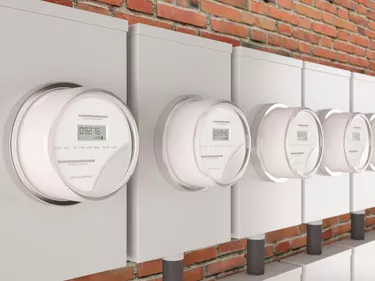
If you're starting out on your own for the first time or you're moving to another house or apartment, you're probably not too enthusiastic about paying a deposit for your electric. While almost all electric companies have guidelines in place for deposits, not all require them for every customer. If you have paid for utilities in the past, have good credit or have a co-signer, the company may waive the deposit.
Tip
Under certain circumstances, your electricity deposit can be waived.
Video of the Day
Why an Electricity Deposit is Requested
Electric companies typically ask for a deposit if the company feels a person is a high-risk candidate, which basically means the company believes the person may default on his bill. Electricity deposits are almost always required for first-time renters or first-time home owners without a previous record of utility payments. The deposit amount varies drastically for each company and also depends on where you live. Some utility companies charge a a flat deposit, whiles others charge an amount equal to two times the average monthly electric charge, for example.
Video of the Day
History of Utilities
Generally, an electric company will waive the deposit if you have a past history of paying a utility bill and have good credit. The electric company will normally request proof of past utilities and will also run a credit check to verify your credit worthiness. Each company has specific guidelines as to what it defines as good credit and poor credit, but if your credit score is over 620, you shouldn't have any problems passing the credit check.
The company may also waive a deposit if you have a well-qualified co-signer who meets the above requirements. If you have a late payment or default payment on your credit report, it may be grounds for a deposit.
Some companies, like Ambit Energy, are also willing to waive the deposit requirement for the following reasons: you are a senior citizen, you are a victim of domestic violence, you have proof of medical indigence or you have a letter of credit from a previous utility company.
Paying for the Deposit
If the electric company does request a deposit, you will often be given a choice to pay it in one installment or multiple installments. Unlike a loan, a deposit carries no interest, which means you're not at a disadvantage if you wish to pay it in multiple installments. However, most electric companies will state that if you are late paying one installment, you must immediately pay the entire deposit in full. If you do choose multiple installments, each installment will be added to each month's electric bill, until the deposit is fully paid.
Getting Your Deposit Back
As long as you pay each bill, the electric company will refund you your deposit if you are moving to another location. The refund will only be given in full if you make the final electricity payment. You may not be eligible to receive your refund if you are moving to another location within the electric company's zone. Some companies may credit a percentage of your deposit to your bill at the beginning of each year, although not all companies adhere to this practice.